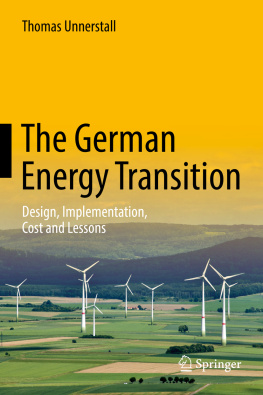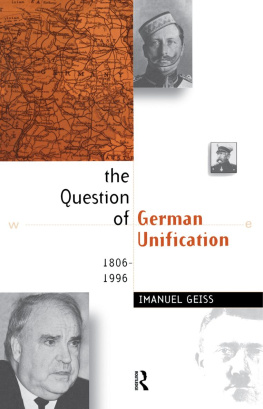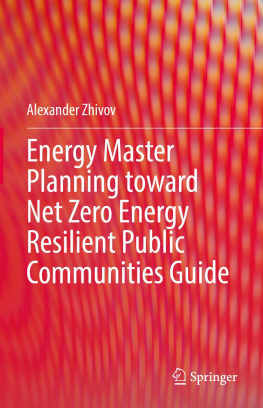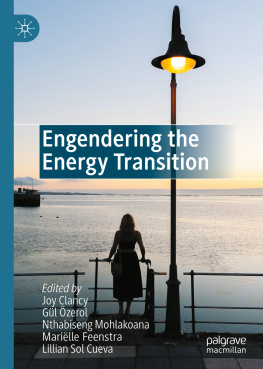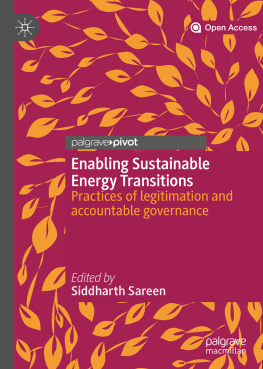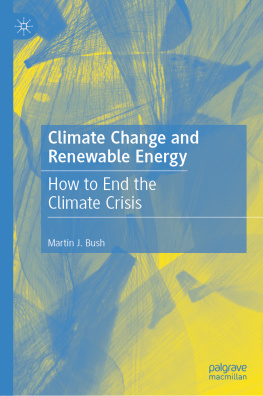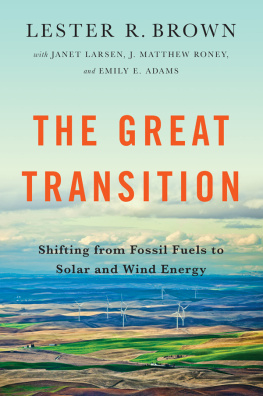1. Introduction: What Is This Book About?
1.1 Five Questions
In Germany, few political concepts have penetrated so deeply into the public consciousness as the Energiewende . This German term describes the transition to a sustainable energy economy and literally means energy turnaround, although it is usually translated as energy transition. And it is unlikely that there exists another political projector political visionthat enjoys such a wide-ranging, fundamental consensus in German politics, business and society as the Energiewende .
Internationally, too, the Energiewende certainly appears to have received more attention than most other projects by the German government. Many countries respect, even admire, Germany for this project and itsin global comparisonvery ambitious goals. The main reason for the Energiewende s remarkable popularity is undoubtedly the fact that it can essentially be regarded as the German response to climate change , which is perceived as one of the greatest challenges, if not the greatest challenge, that humanity faces today.
In marked contrast to this picture, ever since the official launch in 2010/2011 Germany has struggled through years of ongoing and intense public controversy around the Energiewende , including repeated and severe criticism of the projectwith the result that many citizens (while maintaining a positive attitude to the Energiewende itself) are now skeptical with respect to its implementation.
Similarly, seeing the way that the Energiewende has developed over the last 5 years, the mood within the global debate about this project has likewise become more skeptical. Earlier in the decade, the majority of comments ran along the lines of: The Energiewende is very demanding, especially from a technological perspective, but the Germans can do it. Today the tune has often changed to: Germanys approach just isnt going to workthe Energiewende is far too expensive and too inefficient (and sometimes international observers venture so far as to say The Germans must be crazy if they go on like that).
Looking closer, key critical statements made about the Energiewende in the course of Germanys public debate turn out to be the same as those made at the international level:
The Energiewende will cost an incredible amount of money; it is too expensive for the German economy.
The Energiewende places too high a burden on private households (electricity prices are too high).
The Energiewende threatens the international competitiveness of German industry (electricity prices are too high).
German CO2 emissions have barely decreased despite the Energiewende , and, in any case, the effect of the Energiewende on climate change is practically zero.
Are these statements true or false? Is this criticism of the Energiewende justified or not?
The first essential purpose of this book is to present a comprehensive, systematic and impartial account of the Energiewende on the basis of which these questions can be answered objectively, i.e., drawing on the relevant facts, figures and reliable arguments.
Even though the Energiewende is in its design the transition to a sustainable energy economy in all three energy sectors electricity, heating and transportationin this book we confine ourselves throughout to the electricity sector. The main reason for this is the fact that in the implementation of the Energiewende so far (i.e. in the past 5 years), most of the political efforts, measures and discussions, most of the public debate in Germany as well as (consequently) most of the international attention have been devoted to the electricity sector. In a nutshell, in the first years of the project, the Energiewende in Germany was essentially not an energy transition , but (only) an electricity transition .
(It is certainly justified to criticize this state of affairs, i.e. to demand of the energy policy that similar emphasis be placed on the heating sector and the transportation sector. It would also be possible to point out why it is, on the other hand, certainly understandable that the German Energiewende policy has been one-sided so far in the above sense. And one can ponder the question when/to what degree this has to change in the coming years. But such considerations go beyond the scope of the book.)
Hence, in the following we will use the term Energiewende to mean the German energy transition in the electricity sector.
In addition to the above-mentioned change in the attitude of many international observers towards the German energy transition, the last 5 years have seen a second global development that is important with respect to the aims of this book: a growing awareness among many governments and in the international community of the urgency of the climate problem, which led to the Paris Climate Agreement in December 2015. Through this agreement, all major countries have committed themselves to pursuing the so-called 2 C target, i.e. to cut their CO2 emissions by the middle of the century to a level close to zero. And despite their differing attitudes toward nuclear energy, almost all countries agree that this target should mainly be achieved by way of renewable energies.
But this means nothing less than that a vast number of countries must undergo a fundamental transformation of their own electricity sector within the next 35 years. And since the electricity sectors in many of these countries have characteristics similar to Germanys before its Energiewende at least 60% share of fossil fuels, electricity generation concentrated in relatively few large power plants, mostly close to electricity consumption centresthe challenges for these countries are actually quite similar to those posed for Germany, despite all the differences in detail.
This raises the following key question: If an Energiewende as discussed in this book (i.e. an energy policy with the primary goal of comprehensively replacing fossil fuels with renewable energies in the electricity sector) is essentially indispensable, or in other words, if the German energy transition project is to a certain extent a prototype for similar projects in other countries what lessons can these countries learn from the German example?
Now it is clear that each such individual energy transition project depends heavily on the specific economic, political and technical conditions in the country, and so each country must find its own path. Nevertheless, since learning from mistakes is the best way to learn, we believe it will be helpful and important for national energy transformation processes in other countries to avoid a number of defects in the German energy transition project; in other words, not to commit again what now, with the benefit of 5 years of experience, can reasonably be considered essential political mistakes in the course of the Energiewende .
Therefore, the second essential purpose of this book is to identify these mistakes, again on the basis of the systematic account of the Energiewende we will present here.
The compostion of the book emerges from the two purposes outlined above. In the first part, we provide a clearly structured description of the basic concepts and the concrete design of the Energiewende as well as an analysis of its inevitable consequences for the German electricity system. The second part looks at the current status, mainly comparing the planned milestones of the Energiewende goals with the actual data of 2015 and 2016. This allows us to identify successes as well as shortcomings and failures.

